Principles of Employment Law Essay
VerifiedAdded on 2020/02/05
|9
|3102
|120
Essay
AI Summary
This essay examines the impact of Brexit on UK employment law. It begins by outlining the significant influence of EU law on UK employment rights before the referendum, covering areas such as discrimination, working time, and agency worker rights. The essay then explores the concept of Brexit and its immediate consequences, including uncertainty in the labor market. A key focus is the analysis of how Brexit has affected various aspects of UK employment law, such as holiday pay, agency worker regulations, discrimination laws, TUPE regulations, and gender pay reporting. The essay discusses potential changes and challenges arising from the departure from the EU, considering the complexities of disentangling EU-derived law from UK domestic law. Finally, the essay concludes by summarizing the significant changes and uncertainties facing UK employment law in the post-Brexit era.
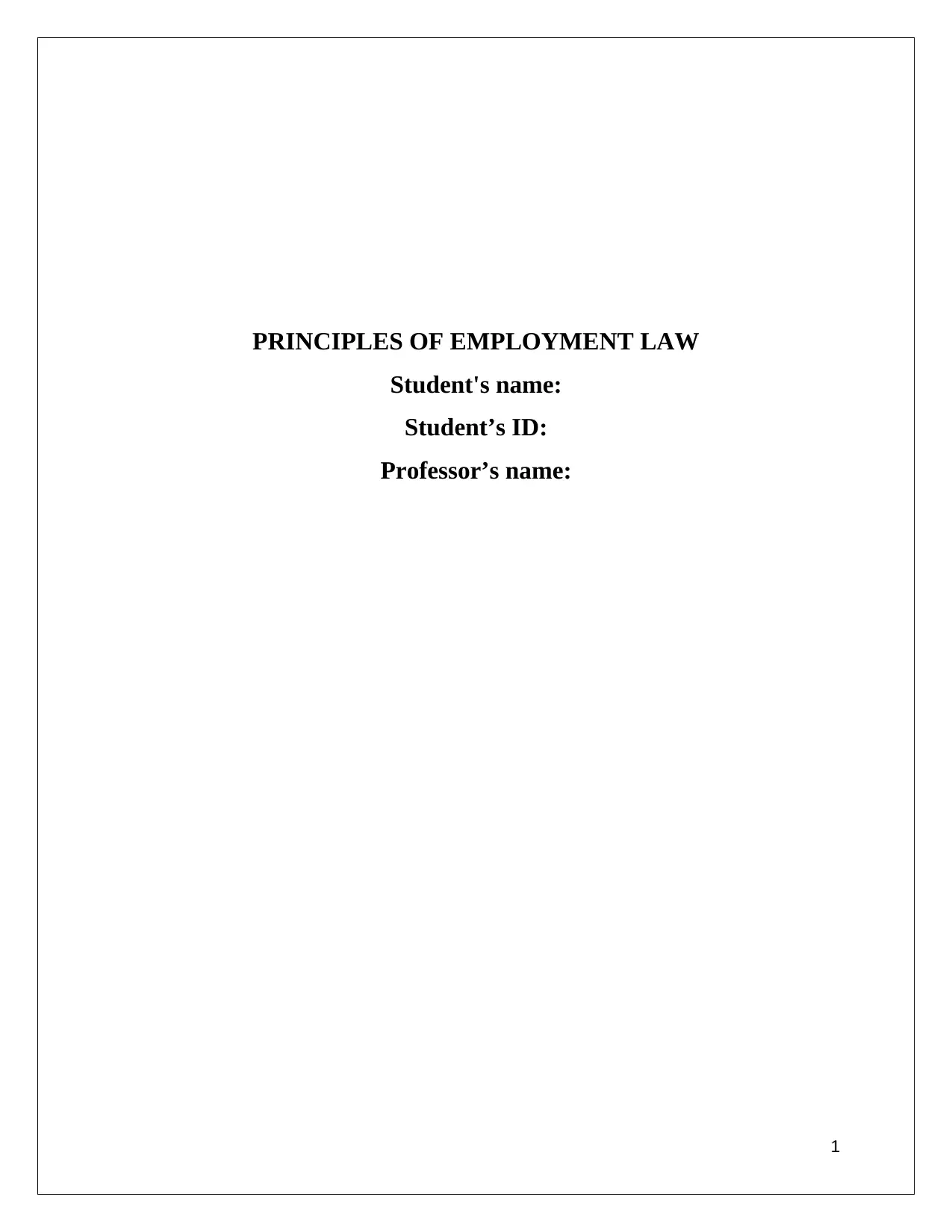
PRINCIPLES OF EMPLOYMENT LAW
Student's name:
Student’s ID:
Professor’s name:
1
Student's name:
Student’s ID:
Professor’s name:
1
Paraphrase This Document
Need a fresh take? Get an instant paraphrase of this document with our AI Paraphraser
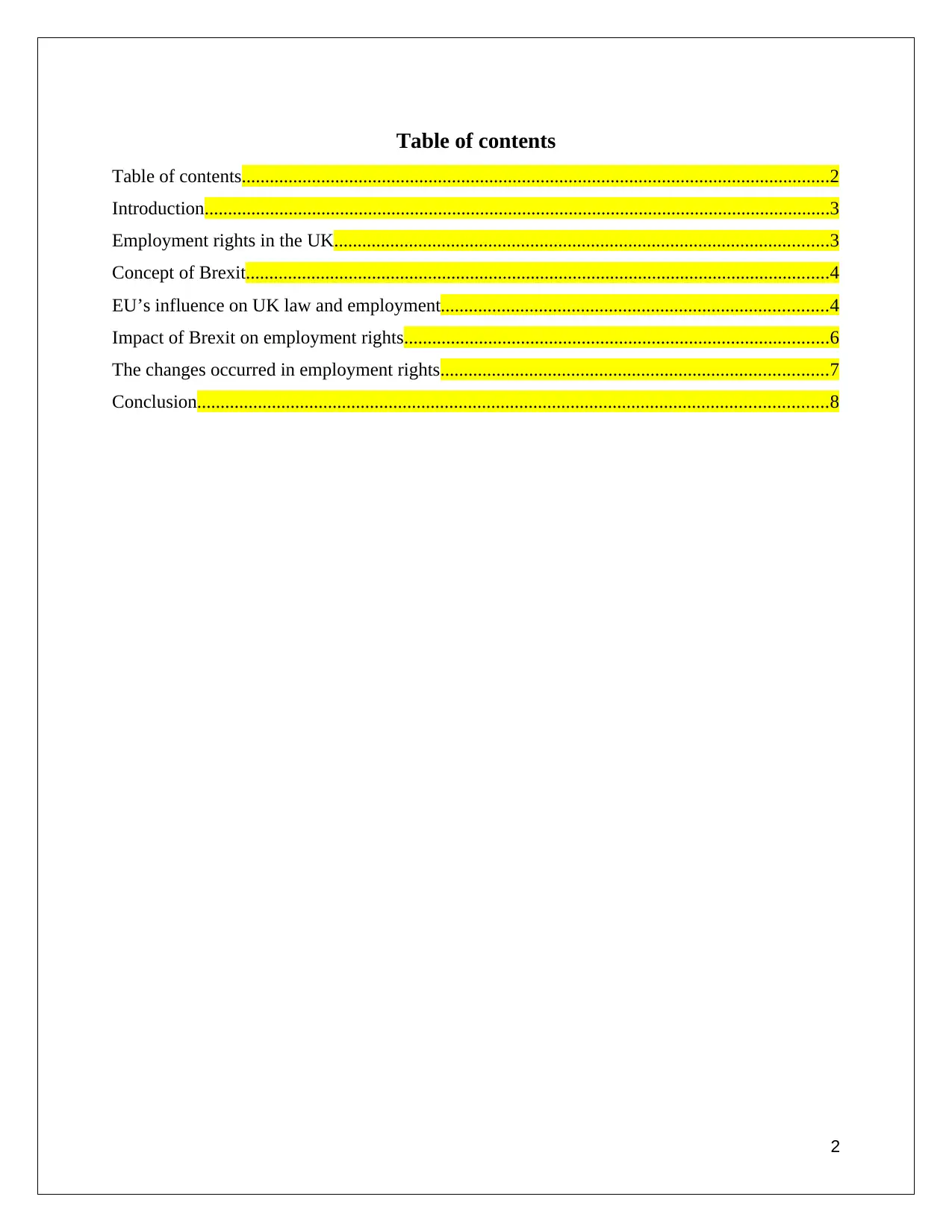
Table of contents
Table of contents..............................................................................................................................2
Introduction......................................................................................................................................3
Employment rights in the UK..........................................................................................................3
Concept of Brexit.............................................................................................................................4
EU’s influence on UK law and employment...................................................................................4
Impact of Brexit on employment rights...........................................................................................6
The changes occurred in employment rights...................................................................................7
Conclusion.......................................................................................................................................8
2
Table of contents..............................................................................................................................2
Introduction......................................................................................................................................3
Employment rights in the UK..........................................................................................................3
Concept of Brexit.............................................................................................................................4
EU’s influence on UK law and employment...................................................................................4
Impact of Brexit on employment rights...........................................................................................6
The changes occurred in employment rights...................................................................................7
Conclusion.......................................................................................................................................8
2
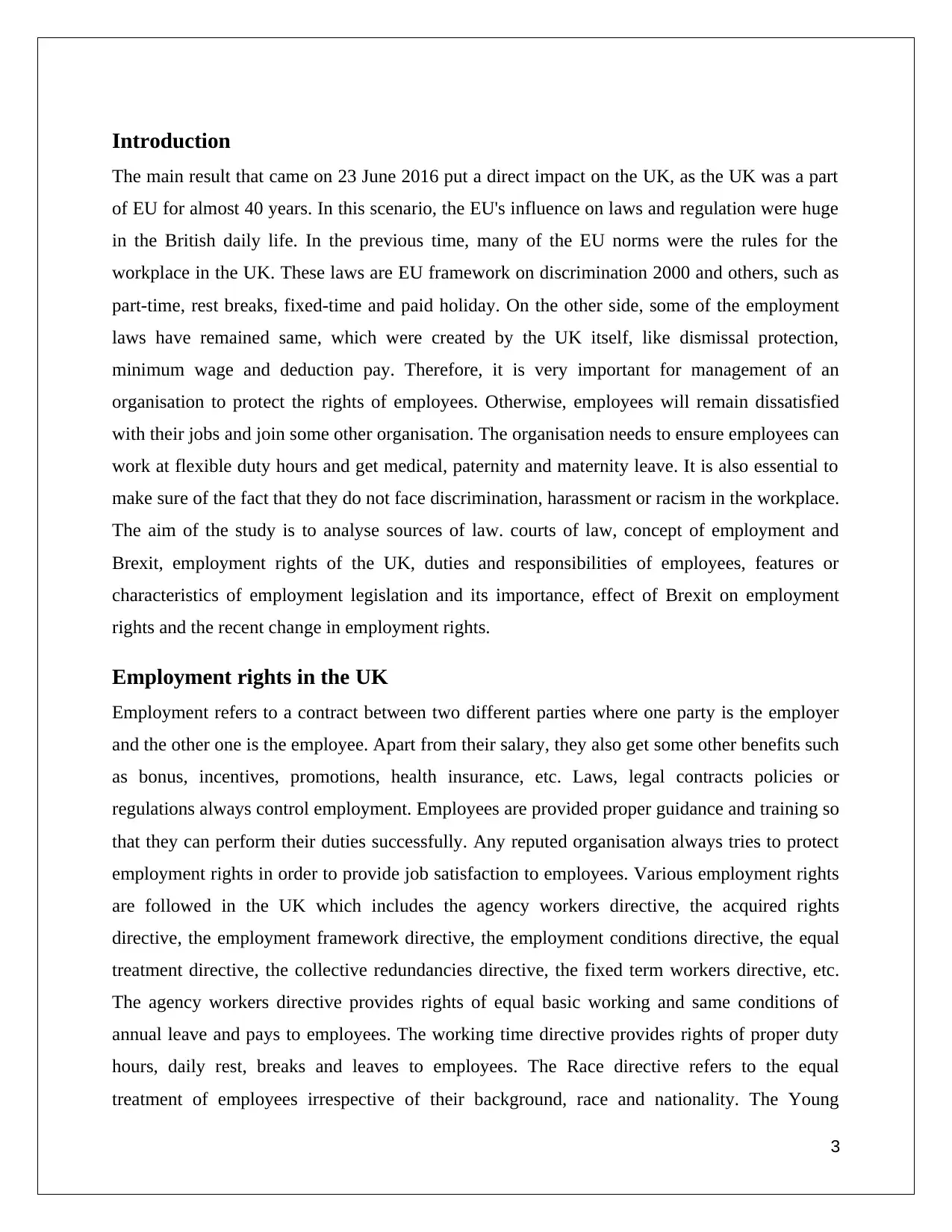
Introduction
The main result that came on 23 June 2016 put a direct impact on the UK, as the UK was a part
of EU for almost 40 years. In this scenario, the EU's influence on laws and regulation were huge
in the British daily life. In the previous time, many of the EU norms were the rules for the
workplace in the UK. These laws are EU framework on discrimination 2000 and others, such as
part-time, rest breaks, fixed-time and paid holiday. On the other side, some of the employment
laws have remained same, which were created by the UK itself, like dismissal protection,
minimum wage and deduction pay. Therefore, it is very important for management of an
organisation to protect the rights of employees. Otherwise, employees will remain dissatisfied
with their jobs and join some other organisation. The organisation needs to ensure employees can
work at flexible duty hours and get medical, paternity and maternity leave. It is also essential to
make sure of the fact that they do not face discrimination, harassment or racism in the workplace.
The aim of the study is to analyse sources of law. courts of law, concept of employment and
Brexit, employment rights of the UK, duties and responsibilities of employees, features or
characteristics of employment legislation and its importance, effect of Brexit on employment
rights and the recent change in employment rights.
Employment rights in the UK
Employment refers to a contract between two different parties where one party is the employer
and the other one is the employee. Apart from their salary, they also get some other benefits such
as bonus, incentives, promotions, health insurance, etc. Laws, legal contracts policies or
regulations always control employment. Employees are provided proper guidance and training so
that they can perform their duties successfully. Any reputed organisation always tries to protect
employment rights in order to provide job satisfaction to employees. Various employment rights
are followed in the UK which includes the agency workers directive, the acquired rights
directive, the employment framework directive, the employment conditions directive, the equal
treatment directive, the collective redundancies directive, the fixed term workers directive, etc.
The agency workers directive provides rights of equal basic working and same conditions of
annual leave and pays to employees. The working time directive provides rights of proper duty
hours, daily rest, breaks and leaves to employees. The Race directive refers to the equal
treatment of employees irrespective of their background, race and nationality. The Young
3
The main result that came on 23 June 2016 put a direct impact on the UK, as the UK was a part
of EU for almost 40 years. In this scenario, the EU's influence on laws and regulation were huge
in the British daily life. In the previous time, many of the EU norms were the rules for the
workplace in the UK. These laws are EU framework on discrimination 2000 and others, such as
part-time, rest breaks, fixed-time and paid holiday. On the other side, some of the employment
laws have remained same, which were created by the UK itself, like dismissal protection,
minimum wage and deduction pay. Therefore, it is very important for management of an
organisation to protect the rights of employees. Otherwise, employees will remain dissatisfied
with their jobs and join some other organisation. The organisation needs to ensure employees can
work at flexible duty hours and get medical, paternity and maternity leave. It is also essential to
make sure of the fact that they do not face discrimination, harassment or racism in the workplace.
The aim of the study is to analyse sources of law. courts of law, concept of employment and
Brexit, employment rights of the UK, duties and responsibilities of employees, features or
characteristics of employment legislation and its importance, effect of Brexit on employment
rights and the recent change in employment rights.
Employment rights in the UK
Employment refers to a contract between two different parties where one party is the employer
and the other one is the employee. Apart from their salary, they also get some other benefits such
as bonus, incentives, promotions, health insurance, etc. Laws, legal contracts policies or
regulations always control employment. Employees are provided proper guidance and training so
that they can perform their duties successfully. Any reputed organisation always tries to protect
employment rights in order to provide job satisfaction to employees. Various employment rights
are followed in the UK which includes the agency workers directive, the acquired rights
directive, the employment framework directive, the employment conditions directive, the equal
treatment directive, the collective redundancies directive, the fixed term workers directive, etc.
The agency workers directive provides rights of equal basic working and same conditions of
annual leave and pays to employees. The working time directive provides rights of proper duty
hours, daily rest, breaks and leaves to employees. The Race directive refers to the equal
treatment of employees irrespective of their background, race and nationality. The Young
3
⊘ This is a preview!⊘
Do you want full access?
Subscribe today to unlock all pages.

Trusted by 1+ million students worldwide
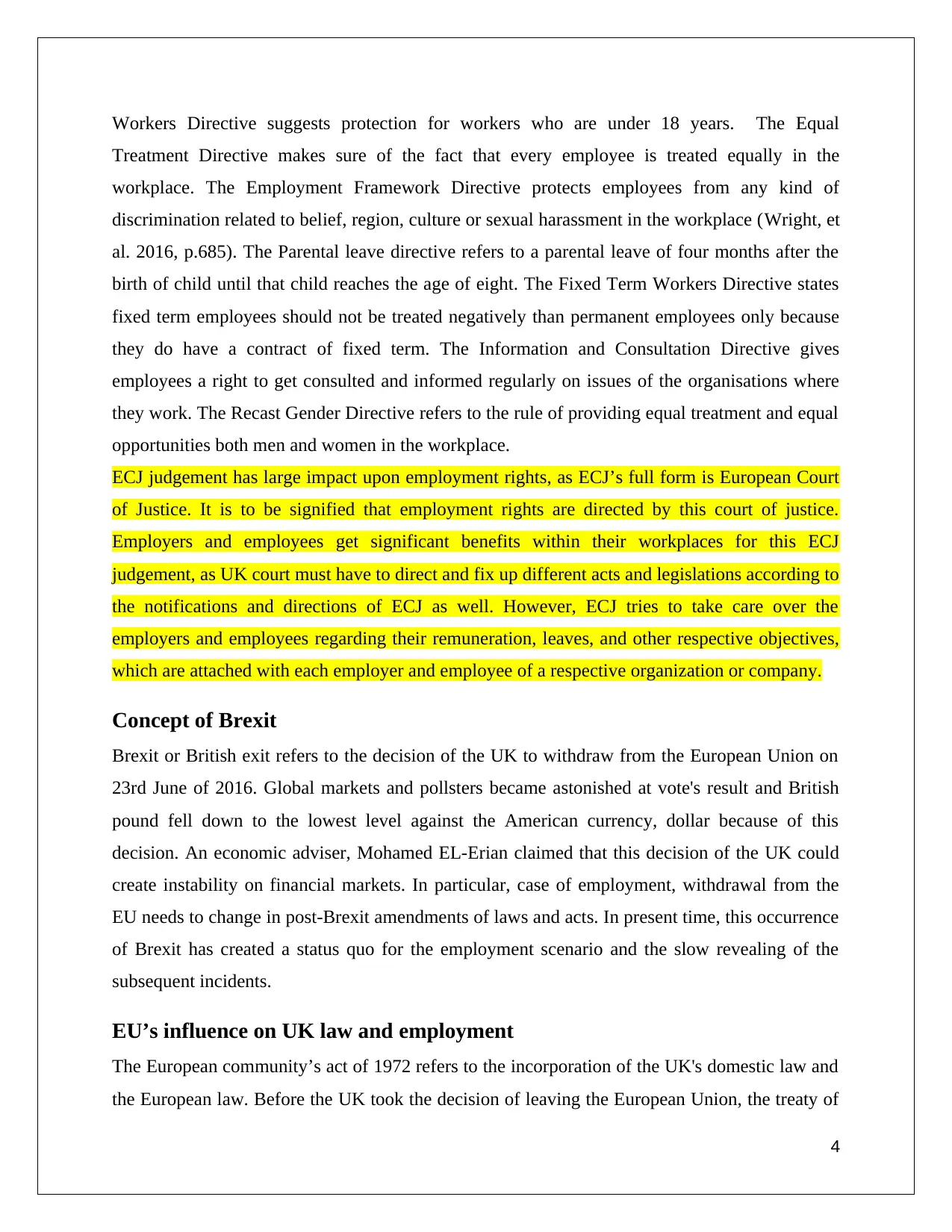
Workers Directive suggests protection for workers who are under 18 years. The Equal
Treatment Directive makes sure of the fact that every employee is treated equally in the
workplace. The Employment Framework Directive protects employees from any kind of
discrimination related to belief, region, culture or sexual harassment in the workplace (Wright, et
al. 2016, p.685). The Parental leave directive refers to a parental leave of four months after the
birth of child until that child reaches the age of eight. The Fixed Term Workers Directive states
fixed term employees should not be treated negatively than permanent employees only because
they do have a contract of fixed term. The Information and Consultation Directive gives
employees a right to get consulted and informed regularly on issues of the organisations where
they work. The Recast Gender Directive refers to the rule of providing equal treatment and equal
opportunities both men and women in the workplace.
ECJ judgement has large impact upon employment rights, as ECJ’s full form is European Court
of Justice. It is to be signified that employment rights are directed by this court of justice.
Employers and employees get significant benefits within their workplaces for this ECJ
judgement, as UK court must have to direct and fix up different acts and legislations according to
the notifications and directions of ECJ as well. However, ECJ tries to take care over the
employers and employees regarding their remuneration, leaves, and other respective objectives,
which are attached with each employer and employee of a respective organization or company.
Concept of Brexit
Brexit or British exit refers to the decision of the UK to withdraw from the European Union on
23rd June of 2016. Global markets and pollsters became astonished at vote's result and British
pound fell down to the lowest level against the American currency, dollar because of this
decision. An economic adviser, Mohamed EL-Erian claimed that this decision of the UK could
create instability on financial markets. In particular, case of employment, withdrawal from the
EU needs to change in post-Brexit amendments of laws and acts. In present time, this occurrence
of Brexit has created a status quo for the employment scenario and the slow revealing of the
subsequent incidents.
EU’s influence on UK law and employment
The European community’s act of 1972 refers to the incorporation of the UK's domestic law and
the European law. Before the UK took the decision of leaving the European Union, the treaty of
4
Treatment Directive makes sure of the fact that every employee is treated equally in the
workplace. The Employment Framework Directive protects employees from any kind of
discrimination related to belief, region, culture or sexual harassment in the workplace (Wright, et
al. 2016, p.685). The Parental leave directive refers to a parental leave of four months after the
birth of child until that child reaches the age of eight. The Fixed Term Workers Directive states
fixed term employees should not be treated negatively than permanent employees only because
they do have a contract of fixed term. The Information and Consultation Directive gives
employees a right to get consulted and informed regularly on issues of the organisations where
they work. The Recast Gender Directive refers to the rule of providing equal treatment and equal
opportunities both men and women in the workplace.
ECJ judgement has large impact upon employment rights, as ECJ’s full form is European Court
of Justice. It is to be signified that employment rights are directed by this court of justice.
Employers and employees get significant benefits within their workplaces for this ECJ
judgement, as UK court must have to direct and fix up different acts and legislations according to
the notifications and directions of ECJ as well. However, ECJ tries to take care over the
employers and employees regarding their remuneration, leaves, and other respective objectives,
which are attached with each employer and employee of a respective organization or company.
Concept of Brexit
Brexit or British exit refers to the decision of the UK to withdraw from the European Union on
23rd June of 2016. Global markets and pollsters became astonished at vote's result and British
pound fell down to the lowest level against the American currency, dollar because of this
decision. An economic adviser, Mohamed EL-Erian claimed that this decision of the UK could
create instability on financial markets. In particular, case of employment, withdrawal from the
EU needs to change in post-Brexit amendments of laws and acts. In present time, this occurrence
of Brexit has created a status quo for the employment scenario and the slow revealing of the
subsequent incidents.
EU’s influence on UK law and employment
The European community’s act of 1972 refers to the incorporation of the UK's domestic law and
the European law. Before the UK took the decision of leaving the European Union, the treaty of
4
Paraphrase This Document
Need a fresh take? Get an instant paraphrase of this document with our AI Paraphraser
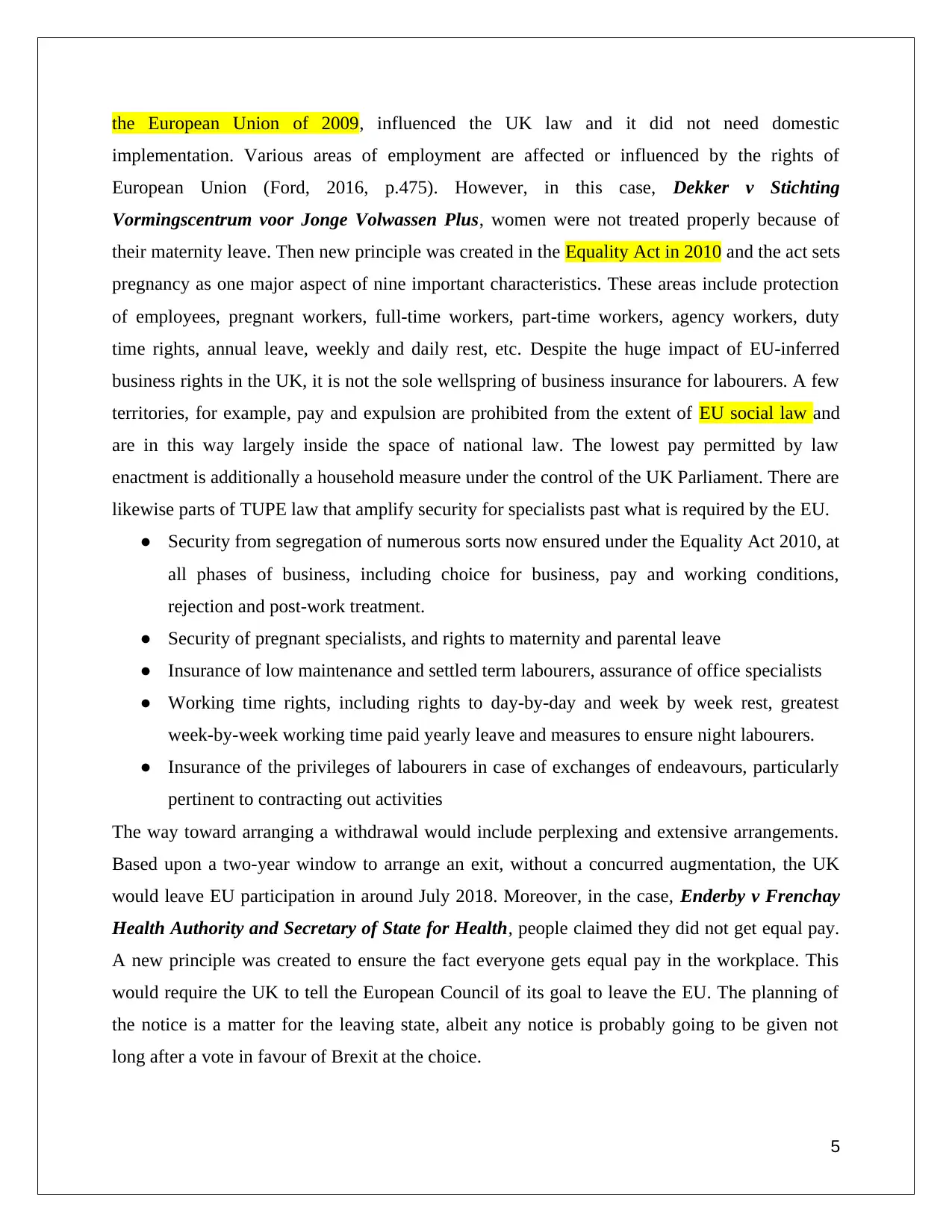
the European Union of 2009, influenced the UK law and it did not need domestic
implementation. Various areas of employment are affected or influenced by the rights of
European Union (Ford, 2016, p.475). However, in this case, Dekker v Stichting
Vormingscentrum voor Jonge Volwassen Plus, women were not treated properly because of
their maternity leave. Then new principle was created in the Equality Act in 2010 and the act sets
pregnancy as one major aspect of nine important characteristics. These areas include protection
of employees, pregnant workers, full-time workers, part-time workers, agency workers, duty
time rights, annual leave, weekly and daily rest, etc. Despite the huge impact of EU-inferred
business rights in the UK, it is not the sole wellspring of business insurance for labourers. A few
territories, for example, pay and expulsion are prohibited from the extent of EU social law and
are in this way largely inside the space of national law. The lowest pay permitted by law
enactment is additionally a household measure under the control of the UK Parliament. There are
likewise parts of TUPE law that amplify security for specialists past what is required by the EU.
● Security from segregation of numerous sorts now ensured under the Equality Act 2010, at
all phases of business, including choice for business, pay and working conditions,
rejection and post-work treatment.
● Security of pregnant specialists, and rights to maternity and parental leave
● Insurance of low maintenance and settled term labourers, assurance of office specialists
● Working time rights, including rights to day-by-day and week by week rest, greatest
week-by-week working time paid yearly leave and measures to ensure night labourers.
● Insurance of the privileges of labourers in case of exchanges of endeavours, particularly
pertinent to contracting out activities
The way toward arranging a withdrawal would include perplexing and extensive arrangements.
Based upon a two-year window to arrange an exit, without a concurred augmentation, the UK
would leave EU participation in around July 2018. Moreover, in the case, Enderby v Frenchay
Health Authority and Secretary of State for Health, people claimed they did not get equal pay.
A new principle was created to ensure the fact everyone gets equal pay in the workplace. This
would require the UK to tell the European Council of its goal to leave the EU. The planning of
the notice is a matter for the leaving state, albeit any notice is probably going to be given not
long after a vote in favour of Brexit at the choice.
5
implementation. Various areas of employment are affected or influenced by the rights of
European Union (Ford, 2016, p.475). However, in this case, Dekker v Stichting
Vormingscentrum voor Jonge Volwassen Plus, women were not treated properly because of
their maternity leave. Then new principle was created in the Equality Act in 2010 and the act sets
pregnancy as one major aspect of nine important characteristics. These areas include protection
of employees, pregnant workers, full-time workers, part-time workers, agency workers, duty
time rights, annual leave, weekly and daily rest, etc. Despite the huge impact of EU-inferred
business rights in the UK, it is not the sole wellspring of business insurance for labourers. A few
territories, for example, pay and expulsion are prohibited from the extent of EU social law and
are in this way largely inside the space of national law. The lowest pay permitted by law
enactment is additionally a household measure under the control of the UK Parliament. There are
likewise parts of TUPE law that amplify security for specialists past what is required by the EU.
● Security from segregation of numerous sorts now ensured under the Equality Act 2010, at
all phases of business, including choice for business, pay and working conditions,
rejection and post-work treatment.
● Security of pregnant specialists, and rights to maternity and parental leave
● Insurance of low maintenance and settled term labourers, assurance of office specialists
● Working time rights, including rights to day-by-day and week by week rest, greatest
week-by-week working time paid yearly leave and measures to ensure night labourers.
● Insurance of the privileges of labourers in case of exchanges of endeavours, particularly
pertinent to contracting out activities
The way toward arranging a withdrawal would include perplexing and extensive arrangements.
Based upon a two-year window to arrange an exit, without a concurred augmentation, the UK
would leave EU participation in around July 2018. Moreover, in the case, Enderby v Frenchay
Health Authority and Secretary of State for Health, people claimed they did not get equal pay.
A new principle was created to ensure the fact everyone gets equal pay in the workplace. This
would require the UK to tell the European Council of its goal to leave the EU. The planning of
the notice is a matter for the leaving state, albeit any notice is probably going to be given not
long after a vote in favour of Brexit at the choice.
5
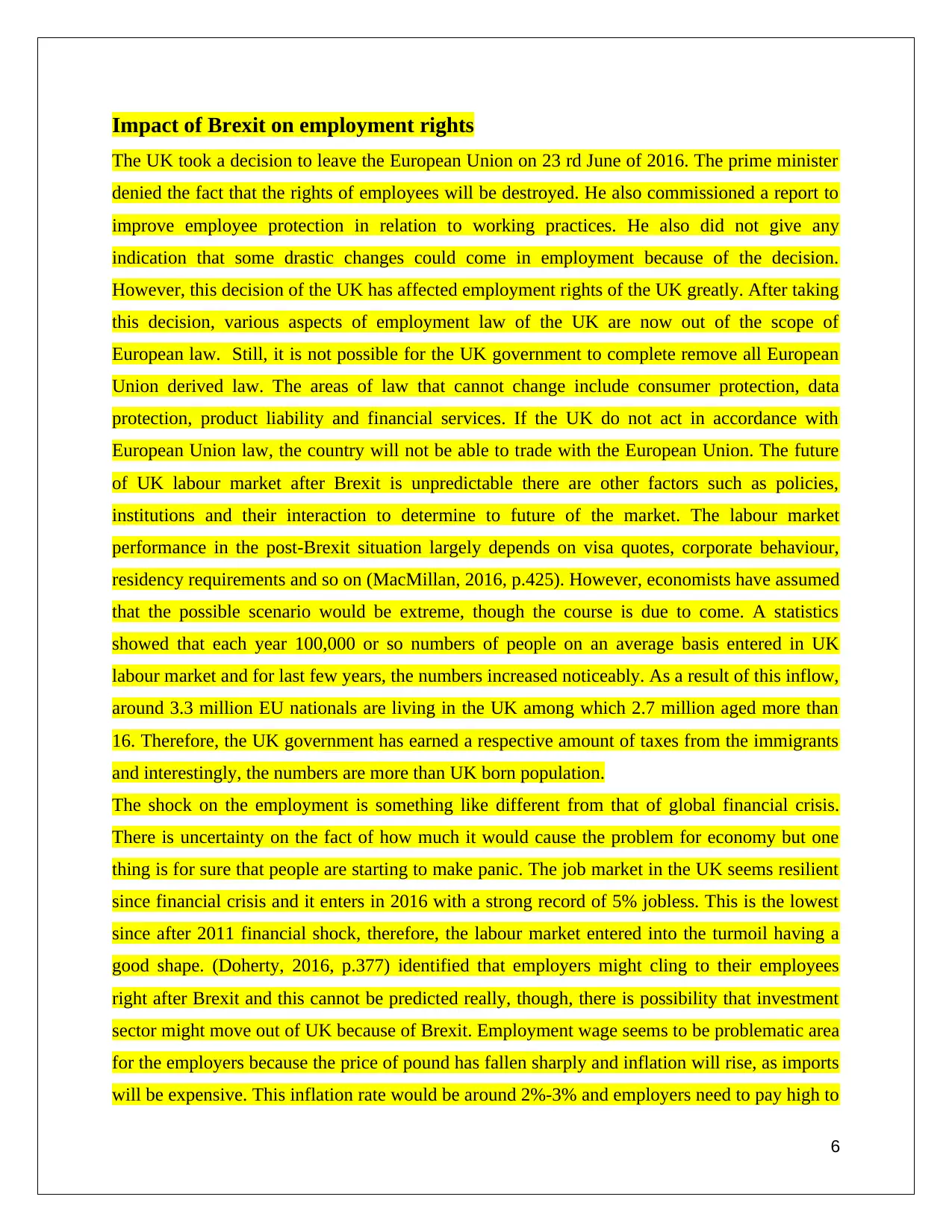
Impact of Brexit on employment rights
The UK took a decision to leave the European Union on 23 rd June of 2016. The prime minister
denied the fact that the rights of employees will be destroyed. He also commissioned a report to
improve employee protection in relation to working practices. He also did not give any
indication that some drastic changes could come in employment because of the decision.
However, this decision of the UK has affected employment rights of the UK greatly. After taking
this decision, various aspects of employment law of the UK are now out of the scope of
European law. Still, it is not possible for the UK government to complete remove all European
Union derived law. The areas of law that cannot change include consumer protection, data
protection, product liability and financial services. If the UK do not act in accordance with
European Union law, the country will not be able to trade with the European Union. The future
of UK labour market after Brexit is unpredictable there are other factors such as policies,
institutions and their interaction to determine to future of the market. The labour market
performance in the post-Brexit situation largely depends on visa quotes, corporate behaviour,
residency requirements and so on (MacMillan, 2016, p.425). However, economists have assumed
that the possible scenario would be extreme, though the course is due to come. A statistics
showed that each year 100,000 or so numbers of people on an average basis entered in UK
labour market and for last few years, the numbers increased noticeably. As a result of this inflow,
around 3.3 million EU nationals are living in the UK among which 2.7 million aged more than
16. Therefore, the UK government has earned a respective amount of taxes from the immigrants
and interestingly, the numbers are more than UK born population.
The shock on the employment is something like different from that of global financial crisis.
There is uncertainty on the fact of how much it would cause the problem for economy but one
thing is for sure that people are starting to make panic. The job market in the UK seems resilient
since financial crisis and it enters in 2016 with a strong record of 5% jobless. This is the lowest
since after 2011 financial shock, therefore, the labour market entered into the turmoil having a
good shape. (Doherty, 2016, p.377) identified that employers might cling to their employees
right after Brexit and this cannot be predicted really, though, there is possibility that investment
sector might move out of UK because of Brexit. Employment wage seems to be problematic area
for the employers because the price of pound has fallen sharply and inflation will rise, as imports
will be expensive. This inflation rate would be around 2%-3% and employers need to pay high to
6
The UK took a decision to leave the European Union on 23 rd June of 2016. The prime minister
denied the fact that the rights of employees will be destroyed. He also commissioned a report to
improve employee protection in relation to working practices. He also did not give any
indication that some drastic changes could come in employment because of the decision.
However, this decision of the UK has affected employment rights of the UK greatly. After taking
this decision, various aspects of employment law of the UK are now out of the scope of
European law. Still, it is not possible for the UK government to complete remove all European
Union derived law. The areas of law that cannot change include consumer protection, data
protection, product liability and financial services. If the UK do not act in accordance with
European Union law, the country will not be able to trade with the European Union. The future
of UK labour market after Brexit is unpredictable there are other factors such as policies,
institutions and their interaction to determine to future of the market. The labour market
performance in the post-Brexit situation largely depends on visa quotes, corporate behaviour,
residency requirements and so on (MacMillan, 2016, p.425). However, economists have assumed
that the possible scenario would be extreme, though the course is due to come. A statistics
showed that each year 100,000 or so numbers of people on an average basis entered in UK
labour market and for last few years, the numbers increased noticeably. As a result of this inflow,
around 3.3 million EU nationals are living in the UK among which 2.7 million aged more than
16. Therefore, the UK government has earned a respective amount of taxes from the immigrants
and interestingly, the numbers are more than UK born population.
The shock on the employment is something like different from that of global financial crisis.
There is uncertainty on the fact of how much it would cause the problem for economy but one
thing is for sure that people are starting to make panic. The job market in the UK seems resilient
since financial crisis and it enters in 2016 with a strong record of 5% jobless. This is the lowest
since after 2011 financial shock, therefore, the labour market entered into the turmoil having a
good shape. (Doherty, 2016, p.377) identified that employers might cling to their employees
right after Brexit and this cannot be predicted really, though, there is possibility that investment
sector might move out of UK because of Brexit. Employment wage seems to be problematic area
for the employers because the price of pound has fallen sharply and inflation will rise, as imports
will be expensive. This inflation rate would be around 2%-3% and employers need to pay high to
6
⊘ This is a preview!⊘
Do you want full access?
Subscribe today to unlock all pages.

Trusted by 1+ million students worldwide
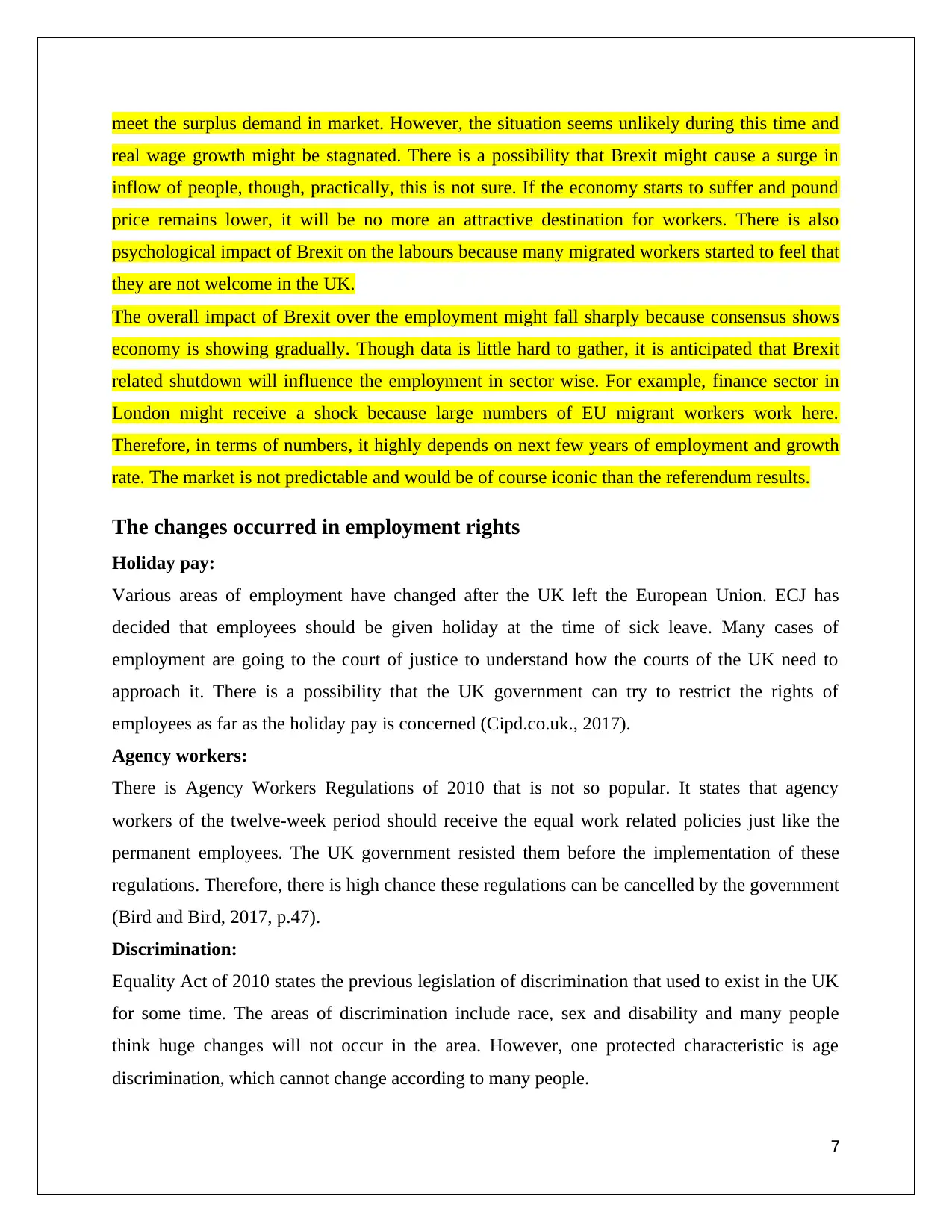
meet the surplus demand in market. However, the situation seems unlikely during this time and
real wage growth might be stagnated. There is a possibility that Brexit might cause a surge in
inflow of people, though, practically, this is not sure. If the economy starts to suffer and pound
price remains lower, it will be no more an attractive destination for workers. There is also
psychological impact of Brexit on the labours because many migrated workers started to feel that
they are not welcome in the UK.
The overall impact of Brexit over the employment might fall sharply because consensus shows
economy is showing gradually. Though data is little hard to gather, it is anticipated that Brexit
related shutdown will influence the employment in sector wise. For example, finance sector in
London might receive a shock because large numbers of EU migrant workers work here.
Therefore, in terms of numbers, it highly depends on next few years of employment and growth
rate. The market is not predictable and would be of course iconic than the referendum results.
The changes occurred in employment rights
Holiday pay:
Various areas of employment have changed after the UK left the European Union. ECJ has
decided that employees should be given holiday at the time of sick leave. Many cases of
employment are going to the court of justice to understand how the courts of the UK need to
approach it. There is a possibility that the UK government can try to restrict the rights of
employees as far as the holiday pay is concerned (Cipd.co.uk., 2017).
Agency workers:
There is Agency Workers Regulations of 2010 that is not so popular. It states that agency
workers of the twelve-week period should receive the equal work related policies just like the
permanent employees. The UK government resisted them before the implementation of these
regulations. Therefore, there is high chance these regulations can be cancelled by the government
(Bird and Bird, 2017, p.47).
Discrimination:
Equality Act of 2010 states the previous legislation of discrimination that used to exist in the UK
for some time. The areas of discrimination include race, sex and disability and many people
think huge changes will not occur in the area. However, one protected characteristic is age
discrimination, which cannot change according to many people.
7
real wage growth might be stagnated. There is a possibility that Brexit might cause a surge in
inflow of people, though, practically, this is not sure. If the economy starts to suffer and pound
price remains lower, it will be no more an attractive destination for workers. There is also
psychological impact of Brexit on the labours because many migrated workers started to feel that
they are not welcome in the UK.
The overall impact of Brexit over the employment might fall sharply because consensus shows
economy is showing gradually. Though data is little hard to gather, it is anticipated that Brexit
related shutdown will influence the employment in sector wise. For example, finance sector in
London might receive a shock because large numbers of EU migrant workers work here.
Therefore, in terms of numbers, it highly depends on next few years of employment and growth
rate. The market is not predictable and would be of course iconic than the referendum results.
The changes occurred in employment rights
Holiday pay:
Various areas of employment have changed after the UK left the European Union. ECJ has
decided that employees should be given holiday at the time of sick leave. Many cases of
employment are going to the court of justice to understand how the courts of the UK need to
approach it. There is a possibility that the UK government can try to restrict the rights of
employees as far as the holiday pay is concerned (Cipd.co.uk., 2017).
Agency workers:
There is Agency Workers Regulations of 2010 that is not so popular. It states that agency
workers of the twelve-week period should receive the equal work related policies just like the
permanent employees. The UK government resisted them before the implementation of these
regulations. Therefore, there is high chance these regulations can be cancelled by the government
(Bird and Bird, 2017, p.47).
Discrimination:
Equality Act of 2010 states the previous legislation of discrimination that used to exist in the UK
for some time. The areas of discrimination include race, sex and disability and many people
think huge changes will not occur in the area. However, one protected characteristic is age
discrimination, which cannot change according to many people.
7
Paraphrase This Document
Need a fresh take? Get an instant paraphrase of this document with our AI Paraphraser
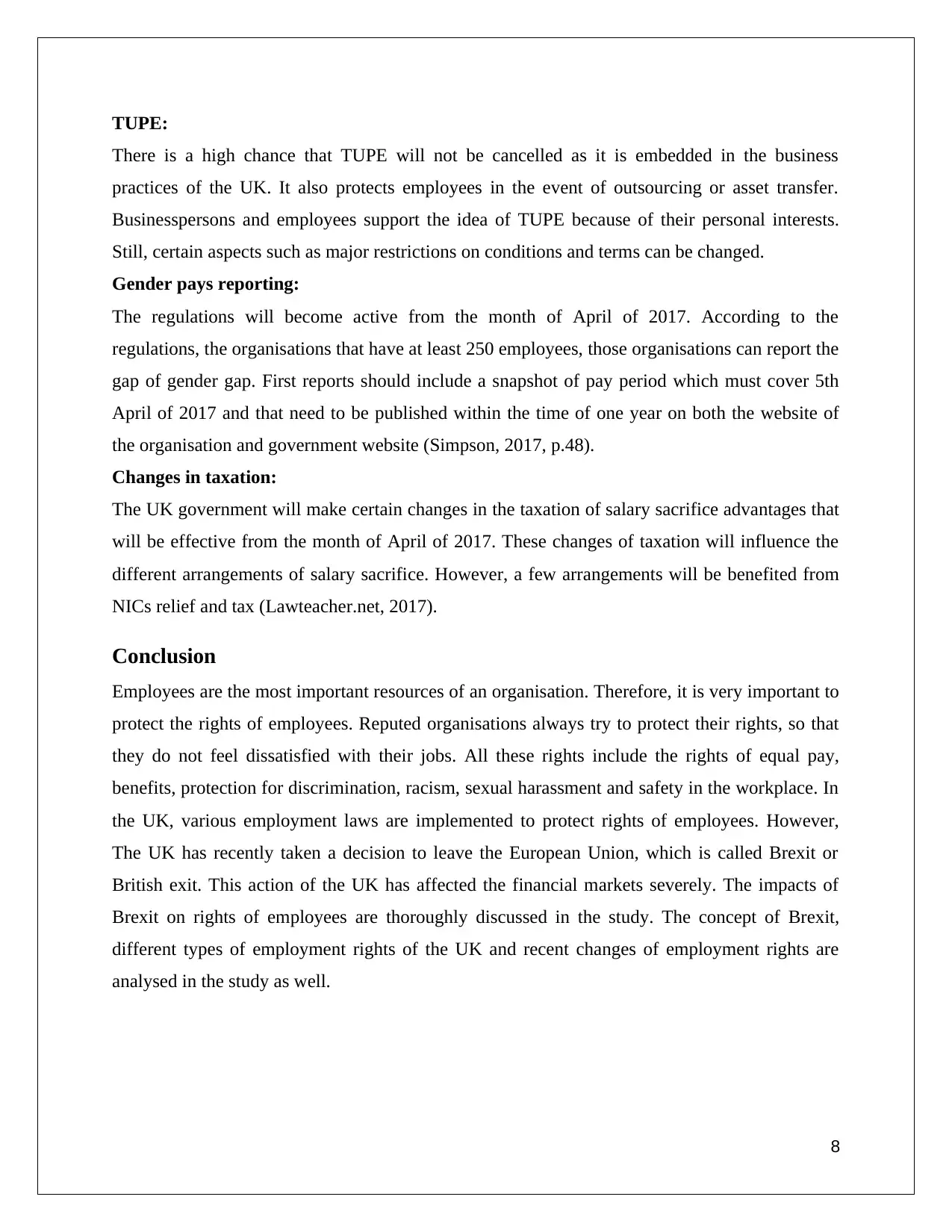
TUPE:
There is a high chance that TUPE will not be cancelled as it is embedded in the business
practices of the UK. It also protects employees in the event of outsourcing or asset transfer.
Businesspersons and employees support the idea of TUPE because of their personal interests.
Still, certain aspects such as major restrictions on conditions and terms can be changed.
Gender pays reporting:
The regulations will become active from the month of April of 2017. According to the
regulations, the organisations that have at least 250 employees, those organisations can report the
gap of gender gap. First reports should include a snapshot of pay period which must cover 5th
April of 2017 and that need to be published within the time of one year on both the website of
the organisation and government website (Simpson, 2017, p.48).
Changes in taxation:
The UK government will make certain changes in the taxation of salary sacrifice advantages that
will be effective from the month of April of 2017. These changes of taxation will influence the
different arrangements of salary sacrifice. However, a few arrangements will be benefited from
NICs relief and tax (Lawteacher.net, 2017).
Conclusion
Employees are the most important resources of an organisation. Therefore, it is very important to
protect the rights of employees. Reputed organisations always try to protect their rights, so that
they do not feel dissatisfied with their jobs. All these rights include the rights of equal pay,
benefits, protection for discrimination, racism, sexual harassment and safety in the workplace. In
the UK, various employment laws are implemented to protect rights of employees. However,
The UK has recently taken a decision to leave the European Union, which is called Brexit or
British exit. This action of the UK has affected the financial markets severely. The impacts of
Brexit on rights of employees are thoroughly discussed in the study. The concept of Brexit,
different types of employment rights of the UK and recent changes of employment rights are
analysed in the study as well.
8
There is a high chance that TUPE will not be cancelled as it is embedded in the business
practices of the UK. It also protects employees in the event of outsourcing or asset transfer.
Businesspersons and employees support the idea of TUPE because of their personal interests.
Still, certain aspects such as major restrictions on conditions and terms can be changed.
Gender pays reporting:
The regulations will become active from the month of April of 2017. According to the
regulations, the organisations that have at least 250 employees, those organisations can report the
gap of gender gap. First reports should include a snapshot of pay period which must cover 5th
April of 2017 and that need to be published within the time of one year on both the website of
the organisation and government website (Simpson, 2017, p.48).
Changes in taxation:
The UK government will make certain changes in the taxation of salary sacrifice advantages that
will be effective from the month of April of 2017. These changes of taxation will influence the
different arrangements of salary sacrifice. However, a few arrangements will be benefited from
NICs relief and tax (Lawteacher.net, 2017).
Conclusion
Employees are the most important resources of an organisation. Therefore, it is very important to
protect the rights of employees. Reputed organisations always try to protect their rights, so that
they do not feel dissatisfied with their jobs. All these rights include the rights of equal pay,
benefits, protection for discrimination, racism, sexual harassment and safety in the workplace. In
the UK, various employment laws are implemented to protect rights of employees. However,
The UK has recently taken a decision to leave the European Union, which is called Brexit or
British exit. This action of the UK has affected the financial markets severely. The impacts of
Brexit on rights of employees are thoroughly discussed in the study. The concept of Brexit,
different types of employment rights of the UK and recent changes of employment rights are
analysed in the study as well.
8
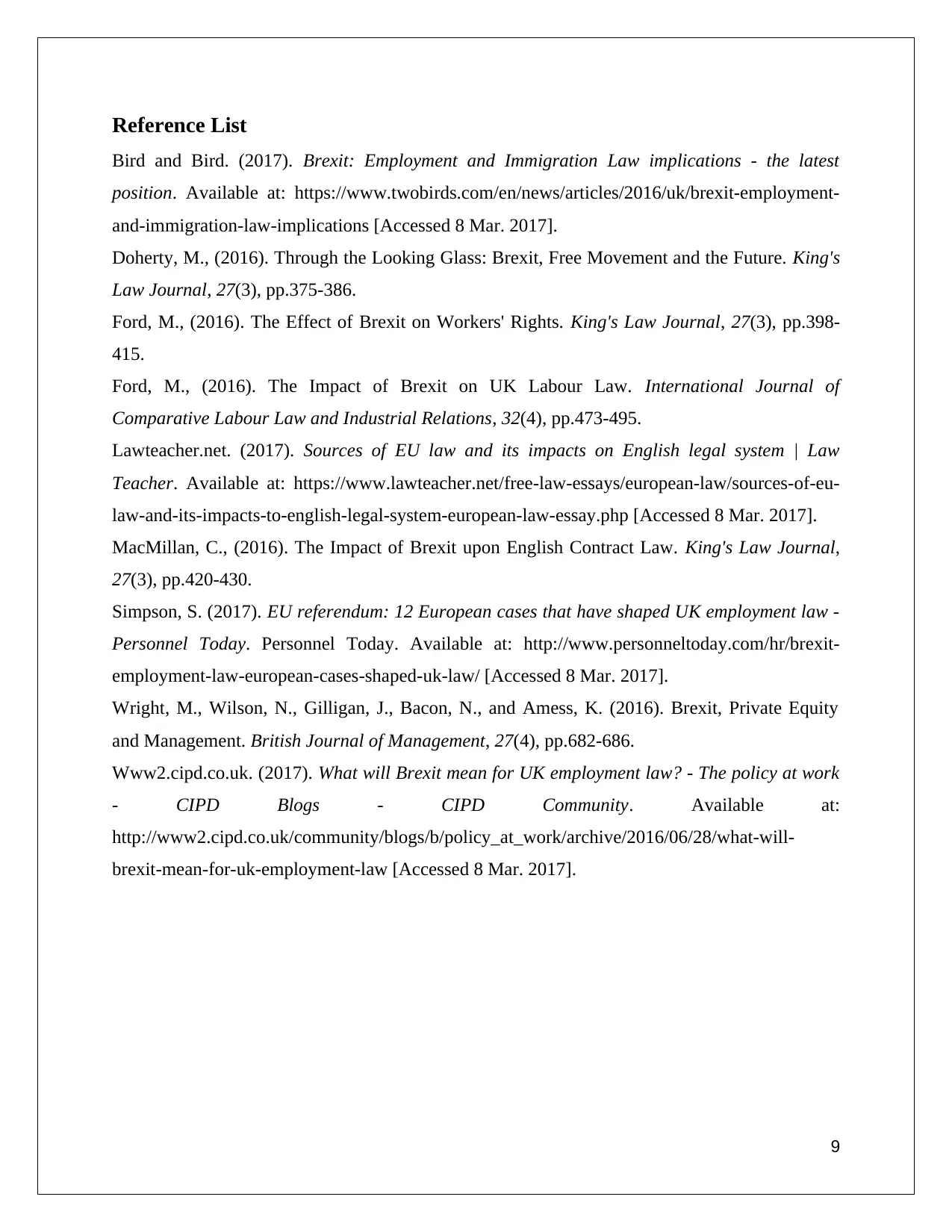
Reference List
Bird and Bird. (2017). Brexit: Employment and Immigration Law implications - the latest
position. Available at: https://www.twobirds.com/en/news/articles/2016/uk/brexit-employment-
and-immigration-law-implications [Accessed 8 Mar. 2017].
Doherty, M., (2016). Through the Looking Glass: Brexit, Free Movement and the Future. King's
Law Journal, 27(3), pp.375-386.
Ford, M., (2016). The Effect of Brexit on Workers' Rights. King's Law Journal, 27(3), pp.398-
415.
Ford, M., (2016). The Impact of Brexit on UK Labour Law. International Journal of
Comparative Labour Law and Industrial Relations, 32(4), pp.473-495.
Lawteacher.net. (2017). Sources of EU law and its impacts on English legal system | Law
Teacher. Available at: https://www.lawteacher.net/free-law-essays/european-law/sources-of-eu-
law-and-its-impacts-to-english-legal-system-european-law-essay.php [Accessed 8 Mar. 2017].
MacMillan, C., (2016). The Impact of Brexit upon English Contract Law. King's Law Journal,
27(3), pp.420-430.
Simpson, S. (2017). EU referendum: 12 European cases that have shaped UK employment law -
Personnel Today. Personnel Today. Available at: http://www.personneltoday.com/hr/brexit-
employment-law-european-cases-shaped-uk-law/ [Accessed 8 Mar. 2017].
Wright, M., Wilson, N., Gilligan, J., Bacon, N., and Amess, K. (2016). Brexit, Private Equity
and Management. British Journal of Management, 27(4), pp.682-686.
Www2.cipd.co.uk. (2017). What will Brexit mean for UK employment law? - The policy at work
- CIPD Blogs - CIPD Community. Available at:
http://www2.cipd.co.uk/community/blogs/b/policy_at_work/archive/2016/06/28/what-will-
brexit-mean-for-uk-employment-law [Accessed 8 Mar. 2017].
9
Bird and Bird. (2017). Brexit: Employment and Immigration Law implications - the latest
position. Available at: https://www.twobirds.com/en/news/articles/2016/uk/brexit-employment-
and-immigration-law-implications [Accessed 8 Mar. 2017].
Doherty, M., (2016). Through the Looking Glass: Brexit, Free Movement and the Future. King's
Law Journal, 27(3), pp.375-386.
Ford, M., (2016). The Effect of Brexit on Workers' Rights. King's Law Journal, 27(3), pp.398-
415.
Ford, M., (2016). The Impact of Brexit on UK Labour Law. International Journal of
Comparative Labour Law and Industrial Relations, 32(4), pp.473-495.
Lawteacher.net. (2017). Sources of EU law and its impacts on English legal system | Law
Teacher. Available at: https://www.lawteacher.net/free-law-essays/european-law/sources-of-eu-
law-and-its-impacts-to-english-legal-system-european-law-essay.php [Accessed 8 Mar. 2017].
MacMillan, C., (2016). The Impact of Brexit upon English Contract Law. King's Law Journal,
27(3), pp.420-430.
Simpson, S. (2017). EU referendum: 12 European cases that have shaped UK employment law -
Personnel Today. Personnel Today. Available at: http://www.personneltoday.com/hr/brexit-
employment-law-european-cases-shaped-uk-law/ [Accessed 8 Mar. 2017].
Wright, M., Wilson, N., Gilligan, J., Bacon, N., and Amess, K. (2016). Brexit, Private Equity
and Management. British Journal of Management, 27(4), pp.682-686.
Www2.cipd.co.uk. (2017). What will Brexit mean for UK employment law? - The policy at work
- CIPD Blogs - CIPD Community. Available at:
http://www2.cipd.co.uk/community/blogs/b/policy_at_work/archive/2016/06/28/what-will-
brexit-mean-for-uk-employment-law [Accessed 8 Mar. 2017].
9
⊘ This is a preview!⊘
Do you want full access?
Subscribe today to unlock all pages.

Trusted by 1+ million students worldwide
1 out of 9
Related Documents
Your All-in-One AI-Powered Toolkit for Academic Success.
+13062052269
info@desklib.com
Available 24*7 on WhatsApp / Email
![[object Object]](/_next/static/media/star-bottom.7253800d.svg)
Unlock your academic potential
Copyright © 2020–2026 A2Z Services. All Rights Reserved. Developed and managed by ZUCOL.





